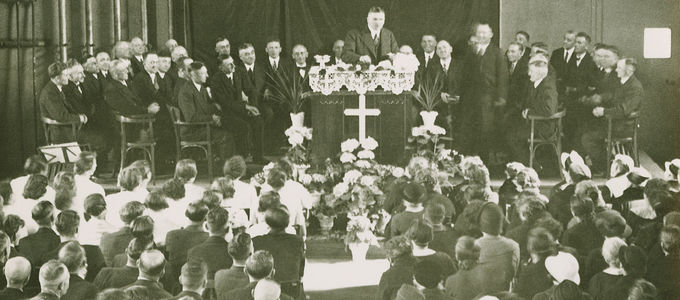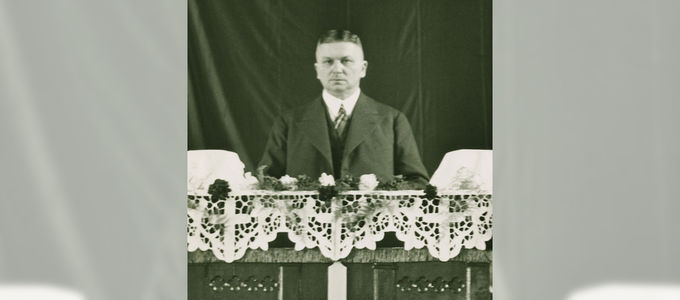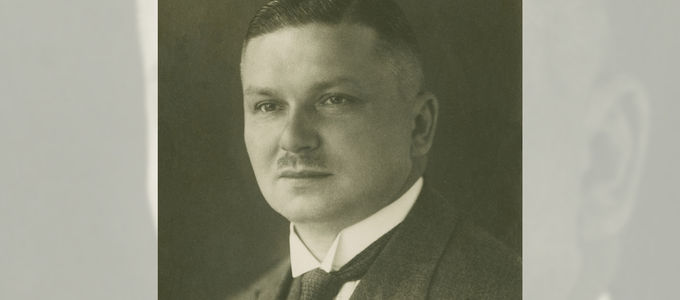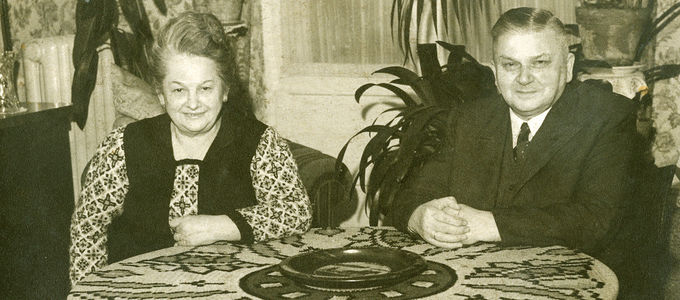
Deputy of the Chief Apostle, his right hand in handling official matters, and a man for all seasons. But he was far more than a bureaucrat: Apostle Arthur Landgraf. Tomorrow he would have been 130 years old.
There was a woman who lost a number of loved ones within a short period of time. When not even the Apostle could comfort the poor woman, he arranged a meeting with Max Hölting. And, amazingly, the blind composer from Berlin actually managed to find a way to comfort her—thanks to the power of his music.
And then there was the mother who wanted to throw her pregnant and unmarried daughter out of the house—this being the 1930s. But Arthur Landgraf managed to convince her that supporting her daughter was the far better course. In the end, the girl even married the father of her child, and he converted to her faith.
A eulogy came to the conclusion: “The Apostle served the children of God with much love, great wisdom, and soothing warmth. In his plain and simple way, guided by a fine instinct for the troubles and cares of those entrusted to him, he quickly won the hearts of the brothers and sisters.”
The Chief Apostle’s deputy
Who was this cultured and elegantly dressed gentleman with the dotted ties and the friendly and warm expression? Born on 20 January 1888 in Saxony (Germany), Arthur Landgraf grew up in poor circumstances. So that his wife would finally stop badgering him, he, then 30 years old, gave in and accompanied her to a New Apostolic service. He stayed.
In 1919 he received the Holy Sealing. In 1921 he was ordained as a Subdeacon. Other ministries followed, and in 1927 he was ordained as an Apostle. In 1928 he was appointed to lead the district of Leipzig as a District Apostle. But there were more responsibilities waiting for him.
He had a distinct sense for the right word at the right time, an engaging personality, a reliable sense of style, literary ability, and leadership qualities … All of these things together induced Chief Apostle Johann G. Bischoff to entrust him with his own Apostle district, namely Frankfurt, and to finally name him his deputy as the chairman of the College of Apostles of the New Apostolic Congregations in Germany.
A man for all seasons
Apostle Landgraf quickly became a specialist for handling delicate matters. For example, at the beginning of 1934, when it became obvious that District Apostle Martin Lax of Berlin was suffering from dementia. It was an extremely delicate situation for all concerned. The Chief Apostle sent his deputy to Berlin in order to convince District Apostle Lax to retire and to take over the leadership of the district.
He also proved his mettle in 1936 when, as a result of a ban by the authorities to collect money, the setting up of offering boxes was prohibited and there was a risk that the authorities would confiscate any money collected. In this politically explosive situation, Apostle Landgraf used his personal contacts to representatives of the Ministry of the Interior and the Ministry of Religion to get the required special permits. The price of his success: ingratiation with government agencies and a sign on the offering boxes that read: “Only for members! (Membership fee)”.
Then there was the time at the beginning of the 1940s when Arthur Landgraf was one of the Apostles who tried to advise Chief Apostle Bischoff to name his successor. Landgraf was one of the three candidates whom his colleagues named as a possible successor. But he stepped down in favour of District Apostle Peter Kuhlen from the Rhineland.
“I am too far away up there”
Despite all of this Apostle Landgraf was not a person who was full of his own importance. An anecdote from the time that the New Apostolic congregation in Neuruppin was using a Catholic chapel as its temporary home illustrates his down-to-earth attitude. When Apostle Landgraf first visited the congregation, he climbed the steps to the pulpit and preached from there.
After the divine service, however, he gathered the ministers around him and said, “I am too far away from you up there and feel very isolated.” From then on a table was put in front of the pulpit to serve as an altar with a lectern and the communion cups.












